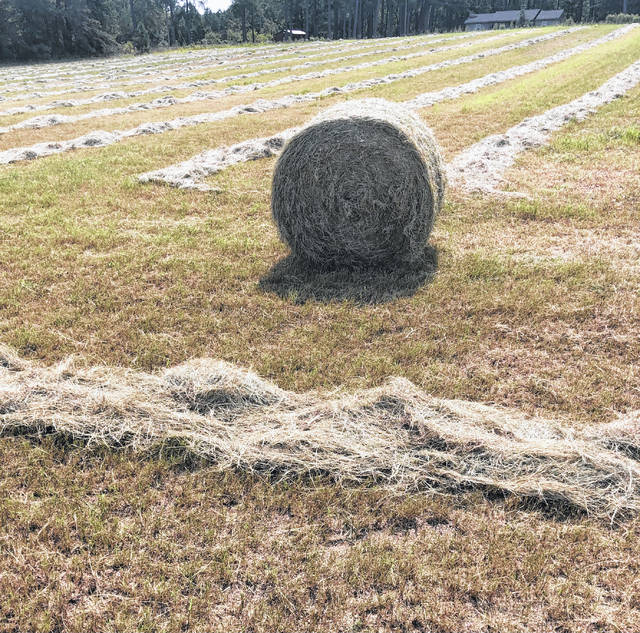
Photo courtesy of Anthony Growe
Hay producers must intensively manage bermudagrass in order to appeal to customers.
Richmond County is home to over 4,000 acres of hay production. The majority of hay acres are planted in hybrid bermudagrass, commonly called Coastal. Richmond county’s environment is very conducive to bermudagrass production. When managed properly, this grass thrives in our warm climate and well-drained soils. Bermudagrass hay is used to feed various types of livestock including cattle, goats and yes, even horses.
Like any crop grown on a farm, hay producers must intensively manage bermudagrass to produce a high-quality, weed-free forage that appeals to their customers and their own livestock. With spring around the corner, now is the time to start planning a weed management strategy.
Soil Fertility and pH
A sound fertility program should be the first line of defense against weed infestations.
When we see weed issues, our first reaction may be to reach for a herbicide product. But as producers, we need to ask ourselves why the weeds are present. Usually, the answer is “bare soil”. When a hay field is struggling in terms of growth it’s typically due to low soil pH or insufficient plant nutrients. Weeds will take advantage of those bare areas and out compete the desired grass. We should take a soil sample in these fields and apply the recommended amendments which the grass needs to gain a competitive edge over the weeds. In other words, we can’t always spray our way out of a soil fertility problem.
Herbicide Recommendations for Grassy Weeds
Even after adjusting the soil’s pH and developing a fertilizer program, there are always a few troublesome weeds that seem to keep coming back. Grassy weeds, such as crabgrass, foxtail and sandspurs, also thrive in our environment and can substantially reduce hay quality. Luckily, there are two pre-emergence herbicide products that are available to help suppress the germination of several grassy weeds.
Rezilon, the newest product to be registered in hay and pasture, is a pre-emergence herbicide that provides residual control of several annual weeds, including crabgrass, foxtail and sandspurs. Another recommended pre-emergence product is Prowl H2O or Satellite Hydrocap. Both products contain the same active ingredient, pendimethalin. This product provides some control of annual weeds although its residual activity is shorter than Rezilon’s. Both of these products need to be applied in late winter or early spring, usually by March, before our summer weeds begin germinating from the soil. This means that our window to apply these products will begin narrowing soon! It’s important to note that if these products are applied after weed seed germination, they will fail to provide acceptable control.
Read the Label
Before using any pesticide be sure to read the product’s label! The label is the law so it’s important that applicators abide by all guidelines and restrictions that are specific to the product being used. Information regarding personal protective equipment, proper disposal and application rates can be found in the label along with other important information. If you have any questions concerning weed control in hayfields or pastures please contact the Richmond County Extension office at (910) 997-8255.
Anthony Growe is the agriculture agent for the Richmond County Cooperative Extension.
